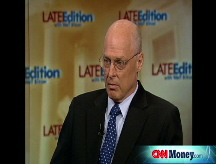Cost of Fannie, Freddie rescue - $25B
Budget agency puts possible price tag on Bush plan to stabilize mortgage finance giants Fannie and Freddie - says 50% chance money won't be needed.
NEW YORK (CNNMoney.com) -- The Congressional Budget Office on Tuesday estimated that a government plan to stabilize mortgage giants Fannie Mae and Freddie Mac could cost government coffers an average of $25 billion.
The CBO said it thinks there is probably a better than 50% chance that the Treasury would not need to step in. It also said there is a 5% chance that Freddie and Fannie's losses would cost the government $100 billion.
CBO's $25 billion cost estimate is an average based on "the path of housing prices in the next several months." They considered three scenarios: prices stabilize, grow modestly or decline steeply.
The CBO report came out a day or two before the House is expected to debate and vote on a rescue plan proposed by Treasury Secretary Henry Paulson last week. Paulson asked Congress to give the Treasury broad, but temporary powers intended to provide a liquidity and capital "backstop" for the two government-sponsored enterprises (GSEs).
Paulson requested that the Treasury be allowed to offer Fannie and Freddie an unlimited line of credit for 18 months and be given authority to buy stock in the companies if necessary.
Both critics and supporters of the Paulson plan have expressed concern that loaning or investing money in the GSEs could leave taxpayers with a fat bill to pay.
In a speech in New York on Tuesday, Paulson stressed again there are no immediate plans to exercise the powers he seeks and characterized the proposal not simply as a way to support Fannie (FNM, Fortune 500) and Freddie (FRE, Fortune 500) but to support the U.S. capital markets and the economy.
"The best way to protect the taxpayer is to have very flexible powers which are temporary," Paulson said. His reasoning: That's the best way to boost market confidence in the two companies and minimize the likelihood that the government would need to lend a hand.
Even though Paulson wants as much flexibility as possible, lawmakers are expected to impose some parameters, such as giving Congress the right to limit executive pay at Fannie and Freddie and insisting that if government money is used the GSEs agree to pay Uncle Sam before paying investors dividends, or if they're liquidated, assets.
Lawmakers have also been resistant to Treasury's request not to count money borrowed to help Fannie and Freddie against the the national debt ceiling. Currently that ceiling is set at $9.815 trillion. As of last week, the country had racked up $9.5 trillion in debt.
But a decision to subject the rescue plan to the limit would not necessarily cap how much Treasury could spend. That's because Congress can vote to raise the ceiling if needed.
"It's not a real limit. The only sense in which it acts as a break [on spending] is the political pressure," said Diane Lim Rogers, chief economist at the Concord Coalition, a deficit watchdog group, and former chief economist of the House Budget Committee. "Lawmakers don't like to take that vote."
Irrespective of a GSE rescue plan, lawmakers have already taken steps to raise the ceiling to $10.6 trillion in fiscal year 2009 - which runs from October 2008 through September 2009.
They want to raise the limit because they have made spending commitments - including additional spending on Iraq - that threatens to pierce the current $9.815 ceiling.
While subjecting the rescue plan to the debt ceiling won't change how much Uncle Sam might spend on the GSEs, it may affect when the limit has to be raised, said Jim Horney, director of federal fiscal policy at the Center on Budget and Policy Priorities.
Indeed, lawmakers may include a debt limit increase in the housing bill, according to a report Tuesday in Congress Daily.
The rush to put into place the authority to help the GSEs was precipitated by investors' concerns that neither Fannie nor Freddie had enough capital on hand to absorb the future losses that could result from a declining housing market. Their stock prices have fallen more than 80% in the past year, with most of those losses coming in the first half of July.
Lawmakers, government officials and regulators have said repeatedly in recent weeks that the GSEs were adequately capitalized, and hold more than is required by law. But their capitalization requirements are likely to increase when Congress finally passes the housing rescue bill it has been debating for months. That bill will create a new, more stringent regulator for the GSEs.
In the meantime, reports Tuesday indicated that bank examiners from the Federal Reserve and the Comptroller of the Currency are scrutinizing the books of Fannie and Freddie.
While putting taxpayer money at risk to aid publicly owned companies is never desirable, many say the cost of not aiding the companies - given their central role in the mortgage market - could be worse. CBO Director Peter Orszag in a briefing Tuesday morning likened the Treasury rescue plan to government aid in a natural disaster.
How the CBO score will play among lawmakers isn't clear yet.
"For those who want to see the housing stimulus bill enacted quickly, the CBO score was not good news. But it is also is not a disaster and it comes in lower than some in the industry were expecting," said Jaret Seiberg, a financial services analyst for the Stanford Group, a Washington policy research firm. "We do not believe the CBO score will derail the broader housing stimulus or the GSE stabilization measures."
- Jessica Knowles, a CNN reporting fellow in Washington, D.C., contributed to this report. ![]()




